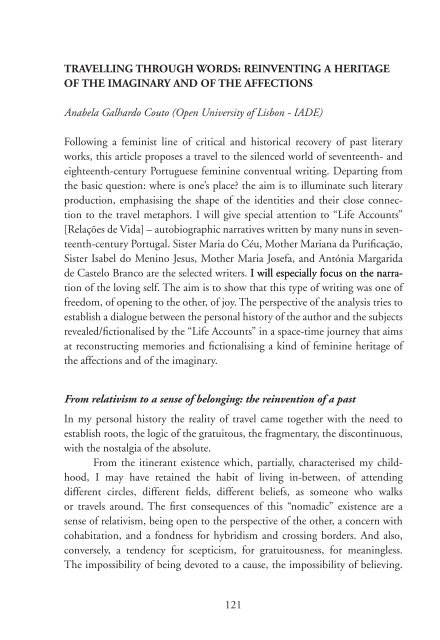Teaching Subjectivity. Travelling Selves for Feminist ... - MailChimp
Teaching Subjectivity. Travelling Selves for Feminist ... - MailChimp
Teaching Subjectivity. Travelling Selves for Feminist ... - MailChimp
Create successful ePaper yourself
Turn your PDF publications into a flip-book with our unique Google optimized e-Paper software.
TRAVELLING THROUGH WORDS: REINVENTING A HERITAGE<br />
OF THE IMAGINARY AND OF THE AFFECTIONS<br />
Anabela Galhardo Couto (Open University of Lisbon - IADE)<br />
Following a feminist line of critical and historical recovery of past literary<br />
works, this article proposes a travel to the silenced world of seventeenth- and<br />
eighteenth-century Portuguese feminine conventual writing. Departing from<br />
the basic question: where is one’s place? the aim is to illuminate such literary<br />
production, emphasising the shape of the identities and their close connection<br />
to the travel metaphors. I will give special attention to “Life Accounts”<br />
[Relações de Vida] – autobiographic narratives written by many nuns in seventeenth-century<br />
Portugal. Sister Maria do Céu, Mother Mariana da Purificação,<br />
Sister Isabel do Menino Jesus, Mother Maria Josefa, and Antónia Margarida<br />
de Castelo Branco are the selected writers. I will especially focus on the narration<br />
of the loving self. The aim is to show that this type of writing was one of<br />
freedom, of opening to the other, of joy. The perspective of the analysis tries to<br />
establish a dialogue between the personal history of the author and the subjects<br />
revealed/fictionalised by the “Life Accounts” in a space-time journey that aims<br />
at reconstructing memories and fictionalising a kind of feminine heritage of<br />
the affections and of the imaginary.<br />
From relativism to a sense of belonging: the reinvention of a past<br />
In my personal history the reality of travel came together with the need to<br />
establish roots, the logic of the gratuitous, the fragmentary, the discontinuous,<br />
with the nostalgia of the absolute.<br />
From the itinerant existence which, partially, characterised my childhood,<br />
I may have retained the habit of living in-between, of attending<br />
different circles, different fields, different beliefs, as someone who walks<br />
or travels around. The first consequences of this “nomadic” existence are a<br />
sense of relativism, being open to the perspective of the other, a concern with<br />
cohabitation, and a fondness <strong>for</strong> hybridism and crossing borders. And also,<br />
conversely, a tendency <strong>for</strong> scepticism, <strong>for</strong> gratuitousness, <strong>for</strong> meaningless.<br />
The impossibility of being devoted to a cause, the impossibility of believing.<br />
121

















